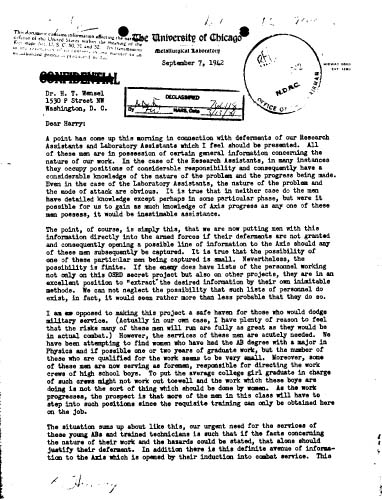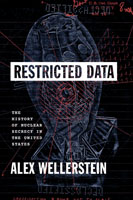One of my basic rules as an historian is look at boring stuff. It’s not exactly what’s going to convince people to sign up for the profession, but maybe that’s a good thing, considering the current job market. But it’s an important thing to do. Keep in mind that I said one should look at boring stuff — that’s not the same thing as writing boring stuff.
Why the boring stuff? Because there is often interesting stuff hidden in boring stuff. And because most historians seem to avoid boring stuff, it means you can sometimes find real gems in places nobody had ever thought to look for them. 1
So here’s a case in point. Buried within the copious archives of the atomic bomb are folders and folders about draft deferments during World War II. Pretty boring, huh? But it actually becomes an interesting place to contemplate the long reach of secrecy policies.
Conscription for World War II started in 1940, when the US was not yet a participant in the war. It ramped up after Pearl Harbor and ended up drafting 11 million men; some 200,000 per month at the height of it. Early on, the choice of who got drafted, and who got deferment, was handled by local draft boards. (Just as an aside, while looking at pictures of WWII draft boards, I came across this one. Unusual facial hair for a guy running a draft board, eh?)
The early work on the atomic bomb, before it fully became the Manhattan Project and was still exclusively under the Office of Scientific Research and Development (OSRD), wasn’t exempt from having its scientists and technicians drafted. They had to write letters to these local draft boards, explaining, in cryptic terms, that the young man in question was actually doing important and irreplaceable war work. And sometimes these local boards would balk, thinking that these fellows were just trying to get out of their patriotic duty, and the officials from the OSRD would have to find a way to convince them that they couldn’t be drafted, without, of course, spilling the beans on the actual war project they were working on. One of the trickiest parts of the Manhattan Project was the fact that it was a secret; that there was a secret was the secret.
Even so, the early deferment requests were often quite specific — a blanket “don’t draft this scientist” request didn’t work on the draft boards coming only from the OSRD. The fact that a given scientist was a “cyclotron engineer” and working at the “Metallurgical Laboratory at the University of Chicago” on “one of the most important projects being conducted by this office [the OSRD]” was disclosed to one Selective Service director at Jefferson City, Missouri. Interestingly, if one had access to all of these deferment letters, one could come up with a pretty good description of the kind of staff specialties required for the early American bomb project, and the sites they took place at.
In theory, anyone could be drafted, no matter what project they were working on, if they were replaceable. Just being on a wartime project wasn’t an excuse for getting out of the draft — you actually had to be doing something that couldn’t just be done by someone else. (Ergo the citation of the special skills — being a “cyclotron engineer” — above.)
This week’s document comes from Norman Hilberry, at the Metallurgical Laboratory at Chicago, to Harry T. Wensel at the OSRD, and relates to the problem of draft deferments. Specifically, it takes up the problem of having any Met Lab research assistants being drafted, even if they are quite generic in their skill levels — because they had been exposed to secrets. 2
As Hilberry wrote, even those with very minor roles at the Met Lab had a pretty good idea of what was going on:
All of these men are in possession of certain general information concerning the nature of our work. In the case of the Research Assistants, in many instances they occupy positions of considerable responsibility and consequently have a considerable knowledge of the nature of the problem and the progress being made. Even in the case of Laboratory Assistants, the nature of the problem and the mode of attack are obvious. It is true that in neither case do the men have detailed knowledge except perhaps in some particular phase, but were it possible for us to gain as much knowledge of Axis progress as any one of these men possess, it would be inestimable assistance.
Without deferments, these men would be going straight into the armed forces, and straight into the front lines, “consequently opening a possible line of information to the Axis should any of these men subsequently be captured.” While unlikely, there was a “finite possibility” that this could occur, and if the Axis were looking for such people, it might find them even easier.
Of course, Hilberry wasn’t suggesting that the uranium work should be filled with active draft dodgers:
I am opposed to making this project a safe haven for those who would dodge military service. (Actually in our own case, I have plenty of reason to feel that the risks many of these men will run are fully as great as they would be in actual combat.) However, the services of these men are acutely needed.
Note that nice parenthetical comment up there — this from one of the associate directors of the project that assembled the first nuclear reactor! Of course, the draft problem could be avoided if women were employed instead of young men, but Hilberry reports that this wasn’t working out:
We have been attempting to find women who have had the AB degree with a major in Physics and if possible one or two years of graduate work, but the number of these who are qualified for the work seems to be very small. Moreover, some of these men are now serving as foremen, responsible for directing the work crews of high school boys. To put the average college girl graduate in charge of such crews might not work out too well and the work which these boys are doing is not the sort of thing which should be done by women.
One wonders what exactly he thought with respects to that last clause. What could be more womanly than radioactive chemistry and physics?
Hilberry concluded:
The situation sums up about like this, our urgent need for the services of these young ABs and trained technicians is such that if the facts concerning the nature of their work and the hazards could be stated, that alone should justify their deferment. In addition there is this definite avenue of information to the Axis which is opened by their induction into combat service. This too, furnishes a strong argument for deferment in spite of the odds against the capture of one of these particular men. Taken together, in my prejudiced eyes, they present an extremely strong case for claiming the deferment of the group. Whether or not the “security” argument is one which can be presented, I do not know but I should like to raise the question for your investigation. I should be glad to hear what sort of comments you get. I am not sure. but what the same line of reasoning as far as the “security” matter is concerned applies just as much to various other OSRD projects as it does to ours.
The deferment issue seems to have gone away by October 1942, when General Groves wrote a letter at Wensel’s request which basically authorized automatic deferments for anything on his watch. Or, to put it another way, Groves had to authorize the disclosure of the fact that the Manhattan Project was a huge deal and the fact that it was a huge secret. He had to give a little knowledge to get a little security — the blanket secrecy and compartmentalization, by itself, was hampering the project’s ability to move forward. This bind was a common one during the war years — the situation in which the fact that there is a secret is itself a secret is much more difficult than the situation where everyone knows that there is something secret going on. In the Cold War, you could say, “this guy is working on secret atomic energy matters” and have that fly; during World War II, it was a stickier situation, because the fact that there were secret atomic energy matters to work on itself constituted most of the secret they were trying to keep.
- My work on the Manhattan Project patenting program came out of just this kind of methodology — looking at folders that don’t obviously “fit” into the standard narrative and don’t sound very interesting.[↩]
- Citation: Norman Hilberry to Harry T. Wensel (7 September 1942), in Bush-Conant File Relating the Development of the Atomic Bomb, 1940-1945, Records of the Office of Scientific Research and Development, RG 227, microfilm publication M1392, National Archives and Records Administration, Washington, D.C., n.d. (ca. 1990), Roll 6, Target 13, Folder 65, “Deferments, General, A to G [1942].”[↩]



I’m with you on looking into boring things — as you say, sometimes you can draw some really interesting stuff out of them. And sometimes boring stuff is, in fact, boring, but it is also important.
Then there is the question of responsibility. I agree with historians who say it is important to write in a more interesting way, but, at the same time, I get the nagging feeling that if we’re trying to be interesting all the time, we’re systematically neglecting things that are innately boring, or at least overly particular, and can never be otherwise. Aren’t we, in some sense, responsible for keeping track of the past, whatever it might have contained, or is that what archivists and antiquarian enthusiasts are for?
I’m a firm believer that if something is actually important in some way, it can be written in an interesting way. And I don’t see a pressing reason to not do things that aren’t in some way important — that’s a pretty low bar! I don’t think that historians should be antiquarians. Just because “it happened” is not a good reason to write about something.
I used to get my best information about the work done at Aldermaston by reading the newsletter they gave the locals to read. It was amazing what you could figure out by reading between the lines (you can ask privately for examples, because I’m not writing them into a blog :->).